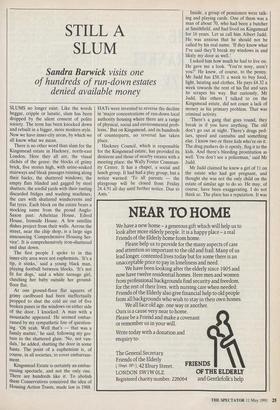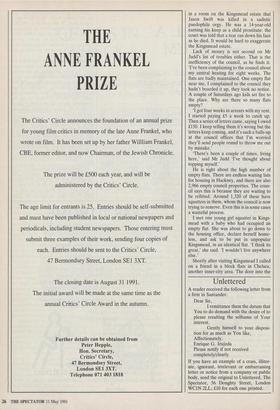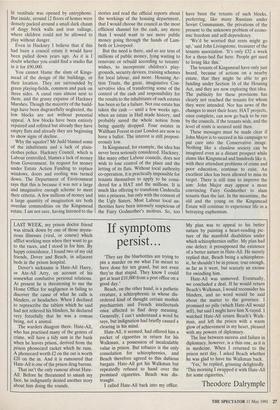STILL A SLUM
Sandra Barwick visits one
of hundreds of run-down estates denied available money
SLUMS no longer exist. Like the words beggar, cripple or lunatic, slum has been dropped by the silent consent of polite society. The term has been knocked down and rebuilt in a bigger, more modern style. Now we have inner-city areas, by which we all know what we mean.
There is no other word than slum for the Kingsmead estate in Hackney, north-east London. Here they all are, the visual clichés of the genre: the blocks of grimy brick, five stories high, with urine-soaked stairways and bleak passages running along their backs; the shattered windows; the empty flats blinded and gagged by steel shutters; the sordid yards with their rusting discarded fridges and washing machines; the cars with shattered windscreens and flat tyres. Each block on the estate bears a mocking name from the proud Anglo- Saxon past: Athelstan House, Edred House, Ironside House. A few satellite dishes project from their walls. Across the street, near the chip shop, is a large sign announcing 'Comprehensive Housing Ser- vice'. It is comprehensively iron-shuttered and shut down.
The first people I spoke to in this inner-city area were not euphemists. 'It's a tip, it stinks,' said a young black man, playing football between blocks. 'It's not fit for dogs,' said a white teenage girl, clutching her baby outside her ground- floor flat.
At one ground-floor flat squares of grimy cardboard had been ineffectually propped to shut the cold air out of five broken panes in the windows on either side of the door. I knocked. A man with a moustache appeared. He seemed embar- rassed by my sympathetic line of question- ing. 'Oh yeah. Well that's — that was a family matter,' he said, following my ges- ture to the shattered glass. 'No, not van- dals,' he added, shutting the door in some haste. The point of a euphemism is, of course, in all societies, to cover embarrass- ment.
Kingsmead Estate is certainly an embar- rassing spectacle, and not the only one. There are hundreds like it. To abolish them Conservatives conceived the idea of Housing Action Trusts, made law in 1988. HATs were invented to reverse the decline in 'major concentrations of run-down local authority housing where there are a range of physical, social and environmental prob- lems.' But on Kingsmead, and its hundreds of counterparts, no reversal has taken place.
Hackney Council, which is responsible for the Kingsmead estate, has provided its denizens and those of nearby estates with a meeting place: the Wally Foster Commun- ity Centre. It has a chapel, a social and lunch group. It had had a play group, but a notice warned: `To all parents — the playgroup will be closed from Friday 24.4.91 all day until further notice. Due to Ants.'
Inside, a group of pensioners were talk- ing and playing cards. One of them was a man of about 70, who had been a butcher at Smithfield, and had lived on Kingsmead for 16 years. Let us call him Albert Judd. He was anxious that he should not be called by his real name. 'If they know what I've said they'll break my windows in and likely my door as well.'
I asked him how much he had to live on. He gave me a look. 'You're nosy, aren't you?' He knew, of course, to the penny. Mr Judd has £58.31 a week to buy food, light, heating and clothes. He pays £4.32 a week towards the rent of his flat and says he scrapes his way. But curiously, Mr Judd, like others I talked to on the Kingsmead estate, did not count a lack of money as his primary problem. That was criminal activity.
`There's a gang that goes round, they break in if you have anything. The old don't go out at night. There's drugs ped- lars, speed and cannabis and something else. I know two or three kids who're on it. The drug pushers do it openly, flog it to the kids. And there's bleeding prostitution as well. You don't see a policeman,' said Mr Judd.
Mr Judd claimed he knew a girl of 11 on the estate who had got pregnant, and thought she was not the only child on the estate of similar age to do so. He may, of course, have been exaggerating. I do not think so. The place has a reputation. It was
in a room on the Kingsmead estate that Jason Swift was killed in a sadistic paedophile orgy. He was a 14-year-old earning his keep as a child prostitute: the court was told that a tear ran down his face as he died. It would be hard to exaggerate the Kingsmead estate.
Lack of money is not second on Mr Judd's list of troubles either. That is the inefficiency of the council, as he finds it. `I've been complaining to the council about my central heating for eight weeks. The flats are badly maintained. One empty flat near me, I complained to the council they hadn't boarded it up, they took no notice. A couple of Saturdays ago kids set fire to the place. Why are there so many flats empty?
`I got four weeks in arrears with my rent. I started paying £5 a week to catch up. Then a series of letters came, saying I owed £150. I keep telling them it's wrong but the letters keep coming, and it's such a balls-up at the council offices that I'm worried they'll send people round to throw me out by mistake.'
`There's been a couple of times, living here,' said Mr Judd 'I've thought about topping myself.'
He is right about the high number of empty flats. There are endless waiting lists for housing in Hackney, and there are also 2,966 empty council properties. The coun- cil says this is because they are waiting to be refitted. Around 1,320 of these have squatters in them, whom the council is now trying to remove. Even this is in some cases a wasteful process.
I met one young girl squatter in Kings- mead with a baby who had occupied an empty flat. She was about to go down to the housing office, declare herself home- less, and ask to be put in unpopular Kingsmead, in an identical flat. 'I think its great,' she said. 'I wouldn't live anywhere else.'
Shortly after visiting Kingsmead I called on a friend in a block flats in Chelsea, another inner-city area. The door into the lit vestibule was opened by entryphone. But inside, around 12 floors of homes were densely packed around a small dark chasm of dingy brick walls and iron railings, where children could not be allowed to play without danger.
Even in Hackney I believe that if this had been a council estate it would have been pulled down years ago. As it is I doubt whether you could find a studio flat in it for £90,000.
You cannot blame the slum of Kings- mead of the design of the buildings, or their location. They are surrounded by green playing-fields, common and park on three sides. A canal runs almost next to them, and the grassy expanse of Hackney Marshes. Though the majority of the build- ings have been disgracefully neglected, the low blocks are not without potential appeal. A few blocks have been entirely repaired and refitted but already they have empty flats and already they are beginning to show signs of decline.
Why the squalor? Mr Judd blamed some of the inhabitants and a lack of plain- clothes police. Hackney Council, which is Labour controlled, blames a lack of money from Government. Its request for money under Estate Action Funding to replace windows, doors and roofing was turned down. The Department of Environment says that this is because it was not a large and imaginative enough scheme to meet their criteria. A few millions of money and a large quantity of imagination are both overdue commodities on the Kingsmead estate. I am not sure, having listened to the stories and read the official reports about the workings of the housing department, that I would choose the council as the most efficient channel for the cash, any more than I would want to see more public money going through the hands of Lam- beth or Liverpool.
But the need is there, and so are tens of millions of public money, lying waiting to renovate or rebuild according to tenants' wishes, to incorporate children's play- grounds, security devices, training schemes for local labour, and more. Housing Ac- tion Trusts, the great, imaginative Con- servative idea of transferring some of the control of the cash and responsibility for the results to the inhabitants of such estates has been so far a failure. Not one estate has taken the cash — until a few weeks ago, when an estate in Hull made history, and probably saved the whole notion from being quietly dropped. Four estates in Waltham Forest in east London are now to have a ballot. The interest is still prepost- erously low.
In Kingsmead, for example, the idea has never been seriously considered. Hackney, like many other Labour councils, does not wish to lose control of the place and the letting of its flats. Without local authority co-operation, it is practically impossible for tenants themselves to apply to be consi- dered for a HAT and the millions. It is much like offering to transform Cinderella into a princess, but only with the consent of the Ugly Sisters. Most Labour local au- thorities have been intensely suspicious of the Fairy Godmother's motives. So, too have been the tenants of such blocks, preferring, like many Russians under Soviet Communism, the privations of the present to the unknown problem of econo- mic freedom and self-dependency.
`We'd be worried that rents might go up,' said John Livingstone, treasurer of the tenants association. 'It's only £32 a week for a three-bed flat here. People get used to living like this.'
The tenants of Kingsmead have only just heard, because of actions on a nearby estate, that they might be able to get funding under Section 16 of the Housing Act, and they are now exploring that idea. The publicity for these provisions has clearly not reached the tenants for whom they were intended. Nor has news of the changes to meet their fears: HAT projects, once complete, can now go back to be run by the councils, if the tenants wish, and the level of rents is secured until then.
These messages must be made clear if John Major is to succeed in his campaign to put care into the Conservative image. Nothing like a classless society can be imagined even as a distant prospect while slums like Kingsmead and hundreds like it, with their attendant problems of crime and poor education, continue to exist. An excellent idea has been allowed to miss its target. There is still time to improve the aim: John Major may appear a more convincing Fairy Godmother to slum tenants than the last. In the meantime, the old and the young on the Kingsmead Estate will continue to experience life in a betraying euphemism.




























































 Previous page
Previous page